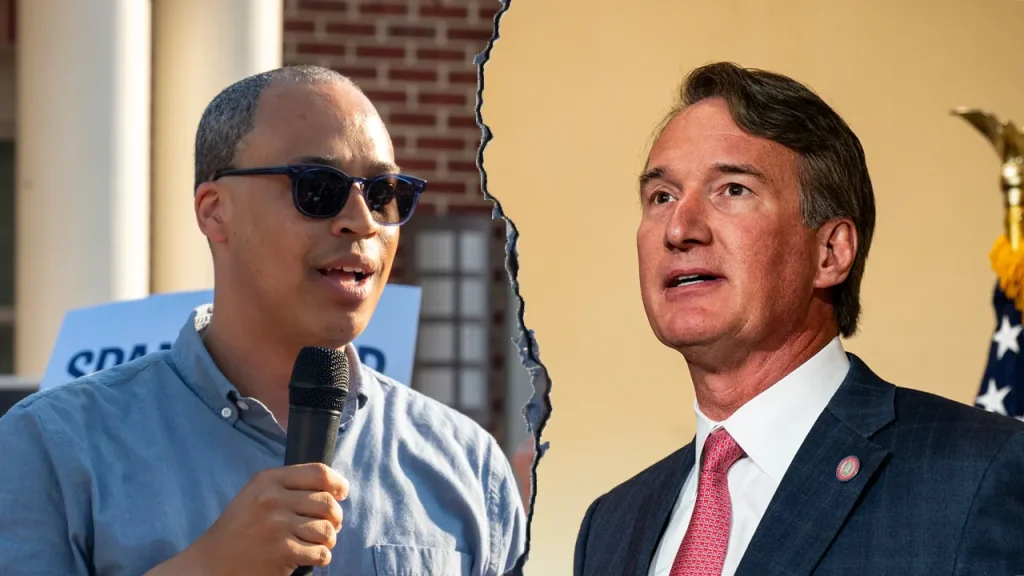Virginia AG Candidate Jay Jones Under Fire for Violent Texts
In a disturbing development that has shaken Virginia’s political landscape, Democratic attorney general candidate Jay Jones finds himself at the center of controversy following the revelation of text messages in which he made violent remarks about former House Speaker Todd Gilbert. The texts, which emerged last Friday, have prompted widespread condemnation and calls for Jones to withdraw from the race, highlighting concerns about the increasingly heated rhetoric in American politics. The controversy raises important questions about the boundaries of political discourse and the responsibility candidates bear for their words, even in private communications.
The text messages in question date back to August 2022, when Jones, who had recently left his position as a delegate from Norfolk, engaged in a conversation with Republican Delegate Carrie Coyner. During this exchange, Jones referenced a hypothetical scenario involving “three people, two bullets,” stating that if faced with Gilbert, Hitler, and Pol Pot, he would give “Gilbert two bullets to the head.” The messages reportedly also included disturbing comments about Gilbert’s children. A spokesperson for Coyner’s campaign confirmed the authenticity of these texts, describing them as “disturbing and disqualifying for anyone who wants to seek public office.” The revelation has sent shockwaves through Virginia’s political establishment, with many questioning whether someone who made such statements, even in private, possesses the temperament and judgment required for the role of the state’s top law enforcement officer.
Virginia Governor Glenn Youngkin swiftly responded to the controversy with a scathing rebuke on social media, calling Jones’ remarks “violent, disgusting rhetoric targeted at an elected official and his children.” The Republican governor argued that the comments were “beyond disqualifying” and criticized Jones for not immediately withdrawing from the race. Youngkin also took aim at other Democratic candidates, including gubernatorial candidate Abigail Spanberger, suggesting they lacked the courage to call for Jones to step aside. The Republican Attorneys General Association joined the chorus of voices demanding Jones’ withdrawal, with RAGA Chairman Kris Kobach emphasizing that “there is no place for political violence, including joking about it — especially from an elected official.” These responses underscore the serious nature of the controversy and reflect growing concerns about threatening rhetoric in an already polarized political climate.
Jones, who is challenging incumbent Republican Attorney General Jason Miyares in the upcoming election, issued an apology following the publication of the texts. In his statement, Jones said, “I take full responsibility for my actions, and I want to issue my deepest apology to Speaker Gilbert and his family.” He acknowledged that “reading back those words made me sick to my stomach” and expressed feeling “embarrassed, ashamed, and sorry.” Jones also mentioned that he had reached out to Gilbert directly to apologize to him and his family. While taking responsibility for his words, Jones did not indicate any intention to withdraw from the race, instead stating that he would “work every day to prove to the people of Virginia” that he would fight for them as Attorney General. His apology emphasized accountability but left open the question of whether such remarks can be overcome in a political campaign.
This controversy emerges at a particularly sensitive moment in American politics, where concerns about political violence have intensified following incidents like the January 6th Capitol riot and attacks on political figures. The revelation of Jones’ texts comes amid growing national conversation about the consequences of inflammatory political rhetoric and the responsibility public figures bear for their words. Political analysts note that the incident may significantly impact the attorney general race in Virginia, which was already expected to be closely contested. For Jones, who had been building his campaign around themes of justice and integrity, the controversy presents a substantial challenge to his electoral prospects and raises questions about his judgment that may be difficult to overcome with voters, especially given that the attorney general serves as the state’s chief legal officer.
The fallout from this incident extends beyond Jones’ individual campaign, potentially affecting other Democratic candidates in Virginia during an important election year. Republicans are likely to use the controversy to paint Democratic candidates broadly as extreme or unsuitable for office, while Democrats face difficult decisions about how to respond to a controversy involving one of their candidates. As Virginia voters process this information, they will ultimately decide whether Jones’ apology is sufficient or whether such remarks represent a disqualifying breach of the public trust. The incident serves as a sobering reminder of the high standards to which public officials are – and should be – held, and the lasting consequences that can result when those standards are not met, even in communications presumed to be private. In an era where the boundaries between public and private communication have blurred, this case underscores the importance of maintaining civility and respect in all political discourse.


